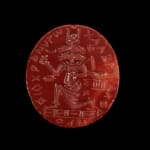RED JASPER GNOSTIC INTAGLIO, 100 BCE - 400 CE
1.07 x 1.24
TAHER.002
Part of a series o Gnosticis Abraxas gem scan.sv Gnosis[show] Gnostic sects[show] Scriptures[show] Influenced by[show] Influence on[show] vt Part of a series o Spiritualit Outlin Religion[show] Traditional[show] Modern[show] Spiritual experience[show]...
Part of a series o Gnosticis Abraxas gem scan.sv Gnosis[show]
Gnostic sects[show]
Scriptures[show]
Influenced by[show]
Influence on[show]
vt Part of a series o Spiritualit Outlin Religion[show]
Traditional[show]
Modern[show]
Spiritual experience[show]
Spiritual development[show]
Influence Western[show]
Orientalist[show]
Asian[show]
Other non-western[show]
Psychological[show]
Researc Neurological[show]
Categor vt Gnosticism (from Ancient Greek: ???st???? gnostikos, "having knowledge", from ???s?? gnosis, knowledge) is a modern name for a variety of ancient religious ideas and systems, originating in Jewish-Christian milieux in the first and second century AD. These systems believed that the material world is created by an emanation of the highest God, trapping the divine spark within the human body. This divine spark could be liberated by gnosis. Some of the core teachings include the following: All matter is evil, and the non-material, spirit-realm is good.
There is an unknowable God, who gave rise to many lesser spirit beings called Aeons.
The creator of the (material) universe is not the supreme god, but an inferior spirit.
Gnosticism does not deal with "sin", only ignorance.
To achieve salvation, one needs to get in touch with secret knowledge.
The Gnostic ideas and systems flourished in the Mediterranean world in the second century AD, in conjunction with and influenced by the early Christian movements and Middle Platonism. After the second century, a decline set in, but Gnosticism persisted throughout the centuries as an undercurrent of Western culture, remanifesting with the Renaissance as Western esotericism, taking prominence with modern spirituality.[citation needed] In the Persian Empire, Gnosticism spread as far as China with Manicheism, while Mandaeism is still alive in Iraq. A major question in scholarly research is the qualification of Gnosticism, based on the study of its texts, as either an interreligious phenomenon or as an independent religion
Gnostic sects[show]
Scriptures[show]
Influenced by[show]
Influence on[show]
vt Part of a series o Spiritualit Outlin Religion[show]
Traditional[show]
Modern[show]
Spiritual experience[show]
Spiritual development[show]
Influence Western[show]
Orientalist[show]
Asian[show]
Other non-western[show]
Psychological[show]
Researc Neurological[show]
Categor vt Gnosticism (from Ancient Greek: ???st???? gnostikos, "having knowledge", from ???s?? gnosis, knowledge) is a modern name for a variety of ancient religious ideas and systems, originating in Jewish-Christian milieux in the first and second century AD. These systems believed that the material world is created by an emanation of the highest God, trapping the divine spark within the human body. This divine spark could be liberated by gnosis. Some of the core teachings include the following: All matter is evil, and the non-material, spirit-realm is good.
There is an unknowable God, who gave rise to many lesser spirit beings called Aeons.
The creator of the (material) universe is not the supreme god, but an inferior spirit.
Gnosticism does not deal with "sin", only ignorance.
To achieve salvation, one needs to get in touch with secret knowledge.
The Gnostic ideas and systems flourished in the Mediterranean world in the second century AD, in conjunction with and influenced by the early Christian movements and Middle Platonism. After the second century, a decline set in, but Gnosticism persisted throughout the centuries as an undercurrent of Western culture, remanifesting with the Renaissance as Western esotericism, taking prominence with modern spirituality.[citation needed] In the Persian Empire, Gnosticism spread as far as China with Manicheism, while Mandaeism is still alive in Iraq. A major question in scholarly research is the qualification of Gnosticism, based on the study of its texts, as either an interreligious phenomenon or as an independent religion



